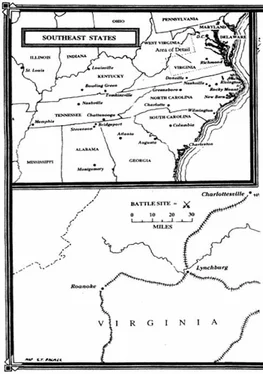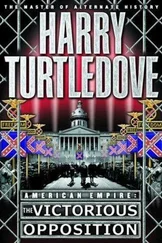Harry Turtledove - The Guns of the South
Здесь есть возможность читать онлайн «Harry Turtledove - The Guns of the South» весь текст электронной книги совершенно бесплатно (целиком полную версию без сокращений). В некоторых случаях можно слушать аудио, скачать через торрент в формате fb2 и присутствует краткое содержание. Год выпуска: 1992, ISBN: 1992, Издательство: Ballantine, Жанр: Альтернативная история, на английском языке. Описание произведения, (предисловие) а так же отзывы посетителей доступны на портале библиотеки ЛибКат.
- Название:The Guns of the South
- Автор:
- Издательство:Ballantine
- Жанр:
- Год:1992
- ISBN:0-345-38468-7
- Рейтинг книги:4 / 5. Голосов: 1
-
Избранное:Добавить в избранное
- Отзывы:
-
Ваша оценка:
- 80
- 1
- 2
- 3
- 4
- 5
The Guns of the South: краткое содержание, описание и аннотация
Предлагаем к чтению аннотацию, описание, краткое содержание или предисловие (зависит от того, что написал сам автор книги «The Guns of the South»). Если вы не нашли необходимую информацию о книге — напишите в комментариях, мы постараемся отыскать её.
The Guns of the South — читать онлайн бесплатно полную книгу (весь текст) целиком
Ниже представлен текст книги, разбитый по страницам. Система сохранения места последней прочитанной страницы, позволяет с удобством читать онлайн бесплатно книгу «The Guns of the South», без необходимости каждый раз заново искать на чём Вы остановились. Поставьте закладку, и сможете в любой момент перейти на страницу, на которой закончили чтение.
Интервал:
Закладка:
But just what even so simple a phrase as “good Southerners like any others” meant would have to be redefined in the years ahead. Would free Negroes be able to join the army? How would that look, black faces in Confederate gray? In 1864 it had been a counsel of desperation, and averted by victory. Now it would have to be seriously considered.
Would free blacks be able to testify against whites in court? For that matter, would they be able to gain the right to vote? Looking ahead, he suspected those things; unthinkable now, might well come with the passage of time. He wondered how many of the congressmen and senators who had voted with him believed they or their successors would ever have to worry about black voters. Few, he was sure: most thought they were giving the Negro just a little freedom.
“But there is no such thing as possessing just a little freedom,” Lee mused. “Once one enjoys any whatsoever, he will seek it all.”
“You got that right, Marse Robert,” Julia said. He started slightly; he hadn’t noticed he was speaking aloud.
He wondered how much change he would get to see himself. When Andries Rhoodie asked if he wanted to learn on what day he would die, he’d answered no without thinking twice. But the Picture History of the Civil War and other volumes from the AWB hoard let him know he ought to have only a little more than two years left: not even enough time to see the first black babies freeborn.
Yet he still had hopes of proving the volumes from the future wrong. The world to which they referred was no longer the one in which he lived. Here and now, he had nitroglycerine pills to lend his heart strength; his hand went to the jar in his waistcoat pocket. That hadn’t been so in the other world, the vanished world, the world where the Confederacy went down to defeat.
Watching his beloved South beaten had probably also helped break his heart in the more usual sense of the phrase. He remembered that unbearably somber photograph of him in the Picture History. What point could his life have had, lived out among the ruins of everything he’d held dear? Even losing Mary could not be a greater grief.
In truth, though, he had purpose as well as medication. If he took care of himself, why shouldn’t he live longer than the vanquished Lee of that vanished world? If God was kind to him, he might yet see Negroes start growing up toward freedom, might even see the end of his term in 1874.
And if not—not. It lay in God’s hands, not his own; God would do as He willed, and against God’s judgments there was no appeal. Lee would go on doing his best for as many days as the Lord chose to grant him. A man could do no more. When he was gone, however far ahead that might be, others would carry on after him.
He looked over his shoulder toward the doorway in which he’d stood when the reporters brought word his bill had passed. “I shall have given those others a fair foundation upon which to build,” he said quietly. Then he started back to his office. Despite the happy nature of the interruption, that letter to the British minister remained to be written.
ACKNOWLEDGMENTS
The Guns of the South would never have been written had Judith Tarr not complained in a letter to me that the cover art for an upcoming book of hers was as anachronistic as Robert E. Lee holding an UZI. That set me wondering how and why he might get his hands on such a weapon. The Guns of the South is the result. Thanks, Judy.
Special thanks go to Chris Bunch, formerly of the U.S. Special Forces, for advice on the care and feeding of the AK-47. Any inaccuracies that may have crept in are purely my own.
This would have been a different, and I think a poorer, book were it not for the exceedingly kind assistance of W. T. Jordan of the North Carolina Department of Archives and History. Responding to a letter from a writer of whom he’d never heard, Mr. Jordan graciously sent me a photocopy of the rare, long-out-of-print regimental history of the 47th North Carolina, which was written by Captain John Thorp of Company A, with an additional sketch by Lieutenant J. Rowan Rogers of Company I.
Moreover, Mr. Jordan is the current editor of the series of volumes entitled North Carolina Troops, 1861–1865: A Roster, volume XI of which contains the detailed roster of the 47th North Carolina. The information contained therein has proved beyond price and given me a great many of my characters.
Thanks to Nashville town manager Tony Robertson for sending me a beautifully detailed map of Nashville. Again, I appreciate the kindness strangers so often show to writers.
Two highly intelligent and well-informed readers, Dan Cragg and Anne Chapman, carefully went over this manuscript after it was submitted. It is considerably improved because of their thoughtful suggestions. Thanks also to Mr. Cragg for the two Minié balls from Fairfax County, Virginia.
And finally, thanks to my wife Laura for her usual thoughtful first reading, fortelling me where I’d gone wrong, for suggesting ways to make things better, for splendid help with the research, and just for being who she is.
HISTORICAL NOTES
If my portrayal of Robert E. Lee seems to bear only a small resemblance to the revisionist one offered by Thomas Connelly in The Marble Man, it is not because I am ignorant of the latter but simply because, in most instances, I disagree with Connelly’s interpretation. Lee’s own writings, I think, show clearly enough what sort of man he was. The fragment of a letter which opens this book is from letter number 610 in the collection The Wartime Papers of Robert E. Lee, edited by Clifford Downey and Louis H. Manarin.
All persons stated to have served with the 47th North Carolina in early 1864 actually did so at that time, in the companies noted and with their proper ranks. There are only two partial exceptions to this rule: I do not know whether the slave George Ballentine still remained with the regiment then, and I do not know the actual company with which Mollie Bean served.
Mollie Bean did serve with the 47th North Carolina. She was, the Richmond Whig of February 20, 1865, tells us (as cited in North Carolina Troops, 1861-1865: A Roster), picked up in uniform not far from Richmond on the night of February 17 and sent into the city for questioning. At the provost marshal’s office, she said she had been with the regiment for two years and had been wounded twice. The Whig story ends, “It will not, we presume, be pretended that she had served so long in the army without her sex being discovered.” But such cases, the Whig notwithstanding, were far from unknown among both the gray and the blue. I have taken a novelist’s liberty in imagining why she joined in the first place.
I have taken similar liberties in inventing occupations for a few minor characters from the 47th when those are not known, but the jobs of most of those who served in that regiment, along with their ages, home counties, and wounds suffered up to the time at which The Guns of the South begins, are authentic. The character I have ascribed to each man is a product of those factors and of my imagination (Billie Beddingfield’s nature is inferred from his habit of repeatedly gaining noncommissioned rank and then being demoted again).
The town of Rivington, North Carolina, is entirely fictitious, as is everything connected with it, including Mollie Bean’s residing there.
The men of the 47th North Carolina could not actually have looked across Washington to see the burning Long Bridge from the position in which I have them doing so. Geography occasionally has to bend just a little to serve the novelist’s needs.
The terms of peace between the United States and Confederate States are based upon those. set forth in a letter of February 8, 1862, from Confederate Secretary of State R. M. T. Hunter to his European commissioners James Mason and John Slidell, as modified by subsequent events both real and imaginary. Lee’s plans for measures limiting slavery are derived from Brazilian constitutional proposals (unfortunately not adopted) of 1823 and from Brazil’s free-birth law of 1871 (I concede the anachronism). Brazil’s Parliament finally adopted full emancipation in 1888.
Читать дальшеИнтервал:
Закладка:
Похожие книги на «The Guns of the South»
Представляем Вашему вниманию похожие книги на «The Guns of the South» списком для выбора. Мы отобрали схожую по названию и смыслу литературу в надежде предоставить читателям больше вариантов отыскать новые, интересные, ещё непрочитанные произведения.
Обсуждение, отзывы о книге «The Guns of the South» и просто собственные мнения читателей. Оставьте ваши комментарии, напишите, что Вы думаете о произведении, его смысле или главных героях. Укажите что конкретно понравилось, а что нет, и почему Вы так считаете.












